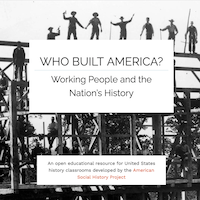History Resources

In digital media, ASHP/CML pioneered the creation of history CD-ROMs and has produced numerous websites, including databases of carefully chosen and contextualized primary source documents, an experiment in narrative and spatial immersion, the first crowdsourced history archive, and online games. And we like people just as much as pixels; ASHP/CML sponsors public programs on issues in public history and education, which take place at our home institution, The Graduate Center of the City University of New York.
In 2020 and 2021, ASHP/CML responded to the need for teaching materials that provide historical context for current events by creating the following online resource pages:
Epidemics in U.S. History
The rapid spread of the COVID-19 virus in the United States and around the world leaves many of us seeking ways to place the pandemic in historical context. ASHP/CML has compiled a list of resources and discussion questions to assist students, teachers, and the general public in understanding past epidemics and connect this knowledge to the present situation.
Historicizing Black Resistance in the U.S.
ASHP/CML has compiled resources for those who want to better understand the history of both black oppression and black resistance that make up the U.S. story. This selective compilation highlights materials drawn from our own collections, plus links to other freely accessible documents, collections, lesson plans, and items suitable for students, teachers, researchers, public historians, and the interested public.
Understanding Elections in U.S. History
Every election is consequential and determining who has the right to vote has been a struggle since the founding of the nation. Elections can also indicate the vitality of democracy itself, testing the structures of government as well as the public’s embrace of democratic principles. For those wanting to better understand this history, the American Social History Project/Center for Media and Learning has gathered a number of documents and teaching resources related to elections in the United States.
Teaching Elections and Mob Violence in U.S. History
On January 6, 2021, members of Congress convened in historic fashion to certify the results of the recent presidential election. But an angry mob stormed Washington, DC, to stop the certification process and demand that the election results be overturned. The events of January 6 were exceptional, but they are connected to a long history of attempts to prevent the exercise of voting rights, particularly among African Americans and other people of color. We have compiled materials and reflection questions to offer a variety of ways to contextualize and understand the siege at the Capitol.
Teaching and Learning LGBTQ+ History of the United States
Not only do we think LGBTQ+ history should be taught, we don’t think it should be relegated to June only! Fortunately, numerous educators, filmmakers, museums, archives and libraries, and historians have worked diligently to preserve LGBTQ+ history and encourage its presentation, both within classrooms and other venues. We have assembled a selective list of resources for educators, students, and others looking for sources for teaching and learning about a variety of topics related to LGBTQ+ experiences in the past.
